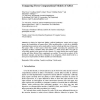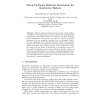86 search results - page 7 / 18 » Quantum Mechanical Model of Emotional Robot Behaviors |
PAAMS
2010
Springer
15 years 5 months ago
2010
Springer
In aiming for behavioral fidelity, artificial intelligence cannot and no longer ignores the formalization of human affect. Affect modeling plays a vital role in faithfully simulati...
ECAL
2005
Springer
15 years 5 months ago
2005
Springer
Abstract. Recently, brain models attempt to support cognitive abilities of artificial organisms. Incremental approaches are often employed to support modelling process. The presen...
104
click to vote
GECCO
2006
Springer
15 years 4 months ago
2006
Springer
Two mathematical and two computational theories from the field of human and animal learning are combined to produce a more general theory of adaptive behavior. The cornerstone of ...
93
Voted
IEAAIE
2010
Springer
14 years 10 months ago
2010
Springer
Behavior generation in humans and animals usually employs a combination of bottom-up and top-down patterns. Most available robotic architectures utilize either bottom-up or top-dow...
113
Voted
ROBOCUP
2004
Springer
15 years 5 months ago
2004
Springer
We show how to apply learning methods to two robotics problems, namely the optimization of the on-board controller of an omnidirectional robot, and the derivation of a model of the...


